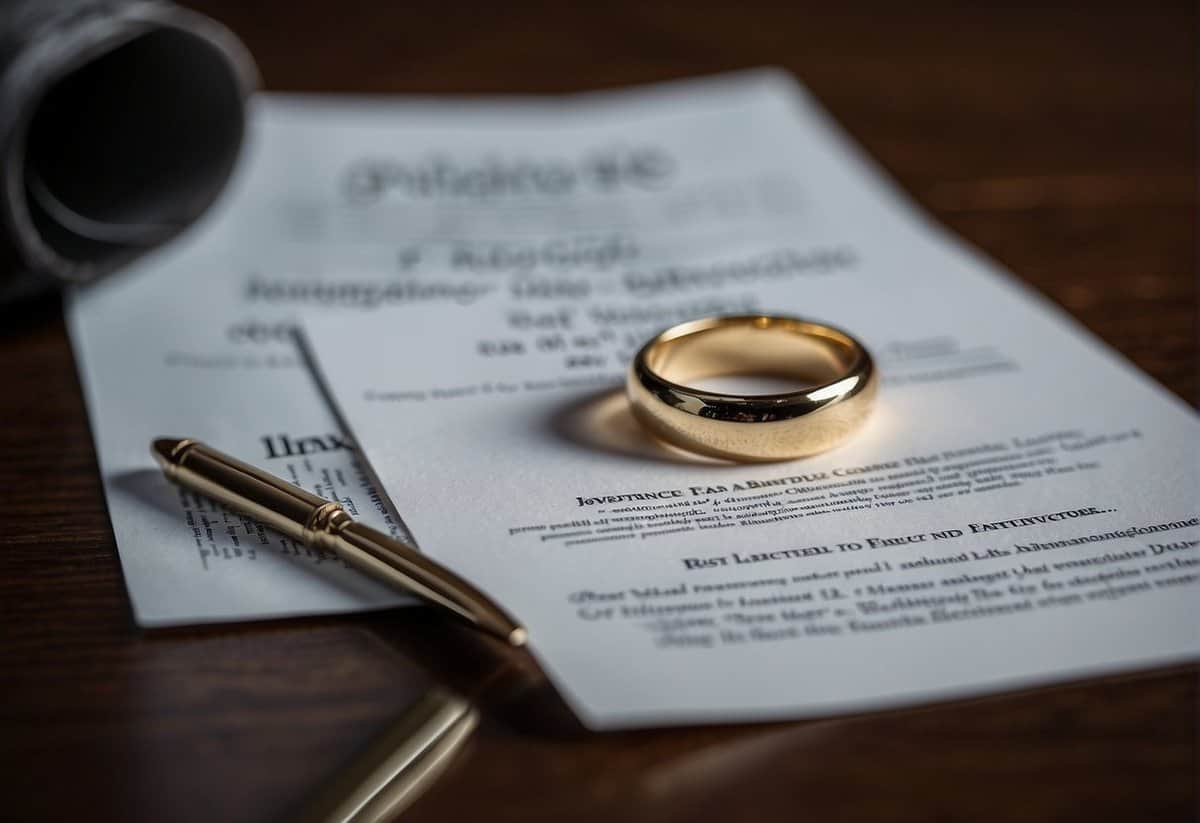Can You Marry Someone If You’re Still Married? Understanding Legal Limitations
Entering into marriage is supposed to be a unique and joyful commitment between two people. However, if you’re considering marriage while still legally bound to another through an undissolved previous marriage, you could unintentionally step into the complex territory of bigamy. Legally, the concept is straightforward: you cannot marry someone if you are already married. Such an action could render the second marriage void and may carry legal repercussions.

The legality of marrying when already married doesn’t just stop at the declaration of the second marriage being void. It also extends to the possible social and financial implications which could affect all parties involved. It’s important to navigate these matters with both sensitivity and adherence to the law. If you find yourself in such a situation, you should seek legal advice and consider all the ramifications before proceeding.
Key Takeaways
- Marriage while still legally married to another person is not legally permissible.
- Bigamy can have significant social and legal consequences.
- Seeking legal counsel is crucial if you are contemplating marriage and are already married.
Legal Aspects of Marrying When Already Married
Before tying the knot, it’s crucial you understand the legal dynamics of marriage, particularly when one party is already married. Ignorance of the law can lead to violations, such as bigamy, which carry severe consequences.

Understanding Bigamy
Bigamy occurs when you enter into a new marriage while your previous marriage is legally valid. In the United States, bigamy is a crime, and the subsequent marriage is typically void. For instance, if you’re legally married and attempt to marry another person, your second marriage is commonly considered null and void.
Divorce Requirements
Before you can legally marry again, a divorce decree must be finalized. This means your previous marriage has been legally dissolved by a court. Without this decree, any subsequent marriage may not be legally recognized. It’s essential to ensure that your divorce is not just filed, but finalized.
Annulment and Prohibited Marriages
In some cases, you may seek an annulment instead of a divorce. An annulment declares that a marriage was invalid from the start. Moreover, state laws may prohibit certain marriages, such as those where parties are closely related. If your marriage falls under these categories, it cannot legally proceed.
Social and Financial Implications

When considering marriage while still legally bound to another person, it’s vital to understand the potential social security benefits and personal finance repercussions. This discussion will guide you through the complexities that such a situation might entail.
Impacts on Social Security and Benefits
If you receive Supplemental Security Income (SSI) or other social security benefits, remarrying could change your financial landscape. Your SSI payment amount might vary depending on your new spouse’s income and assets. Should both you and your spouse be recipients, expect a shift from individual rates to a couple’s rate. Additionally, your entitlement to spousal benefits or survivor benefits could be affected based on your new marital status and combined earnings history. It is essential to understand how a remarriage might alter your retirement benefits.
Personal Finance After Divorce
Post-divorce, managing your personal finance is no small feat. Should you tie the knot again while your previous marriage is still legally recognized, the financial implications could be far-reaching. It’s prudent to scrutinize potential effects on assets, liabilities, and ongoing financial obligations like child support or alimony from your prior marriage. Handling everyday expenses and preparing for future costs, such as child or college tuition, demands careful planning. It’s advisable to consider these financial aspects before making any commitment.
Personal and Emotional Considerations

Navigating the personal and emotional landscape of being in a new relationship while still being legally bound to another can be complex. Your feelings, the reactions of your loved ones, and the potential impact on any ongoing divorce proceedings or custody arrangements are important factors to consider.
Relationship Dynamics
In your current relationship, understanding the legal boundaries is crucial. While being emotionally ready to move on is one aspect, legally, you cannot marry someone if you are still married. If you’re going through a divorce, the emotional transition to a new relationship might be intricate, especially if children are involved and custody arrangements are being determined. Respect and openness with your present partner about the reality of your divorce status can prevent misunderstandings.
- Communication: It’s essential to have honest conversations with your current partner.
- Expectations: Clearly defining what can and cannot happen legally may help manage expectations.
The Role of Counseling
Seeking professional guidance through counseling can be beneficial. A counselor might help you:
Reflect on your personal feelings and readiness for a new relationship.
Navigate the complexities of your emotional attachment to your spouse and any legal entanglements like ongoing divorce proceedings.
Self-reflection: Evaluate your emotional state and readiness for a new commitment.
Counseling Benefits: Gain clarity and strategies for handling complex feelings.
Remember, it’s also advisable to seek legal advice from a lawyer to understand the implications of engaging in a new relationship, particularly if you’re not yet divorced. Managing the intertwining of personal feelings and legal realities requires a delicate balance and a considerate approach.
Practical Steps for Marriage and Remarriage

When considering getting married or remarried, it’s crucial to understand the legal requirements and steps involved to ensure that your new union is valid under law. From obtaining a marriage license to the role of the officiant, each step plays a significant part in establishing your marital status.
Obtaining a Marriage License
To legally marry, you need to obtain a marriage license from your local government office. This process typically requires both partners to present:
- Proof of identity (such as a driver’s license or passport)
- Evidence of age to confirm both are adults (usually 18+, varying by location)
- Confirmation of current marital status (to ensure no existing marriage)
Some states may have a waiting period before the license is valid, and it’s vital to check if this applies as it can vary significantly. Once granted, the marriage license gives you a set timeframe to have your ceremony and legally become spouse and spouse.
The Role of an Officiant in Marriage Ceremonies
An officiant is an indispensable part of your marriage ceremony – someone legally recognized to conduct the ceremony and validate your contract of marriage. The officiant’s duties include:
- Leading the ceremony in compliance with state laws.
- Ensuring the marriage license is signed by the right parties.
- Filing the license with the local government to finalize your marriage certificate.
Make sure to secure a certified copy of your marriage certificate post-ceremony, as it’s essential for legal proof of your marriage. If you’re looking at remarriage, confirm there’s no mandatory waiting period post-divorce, as this is integral to your relationship’s legal validity.
Frequently Asked Questions

When it comes to marrying while still being legally bound to someone else, understanding the legal landscape is crucial. Let’s explore some of the most common questions related to this situation.
What are the legal consequences of marrying someone when you’re already married?
Engaging in marriage with a second person while already married may result in charges of bigamy, which is a criminal offense in many places. The second marriage is typically seen as legally invalid.
Is it possible to obtain a marriage license while still legally married to someone else?
States typically mandate that you are not married to someone else when applying for a marriage license. Hence, obtaining a license while still married to another person is often not possible.
What is the term for being married to two people at the same time?
The act of being married to two people at the same time is known as bigamy.
Are there any specific state laws regarding marrying again before a divorce is finalized?
Yes, state laws on this matter vary, and some may have specific stipulations or waiting periods for remarrying after filing for divorce or having a divorce finalized.
How do authorities verify marital status when applying for a new marriage license?
When you apply for a marriage license, authorities may check your marital status using vital records databases, ensuring that there is no existing legal marriage.
What steps should be taken if you desire to marry someone but have not yet been legally divorced?
It’s essential to first finalize your divorce. Consult a legal professional to understand the process and adhere to your state’s requirements for divorce and remarriage to avoid legal complications.


